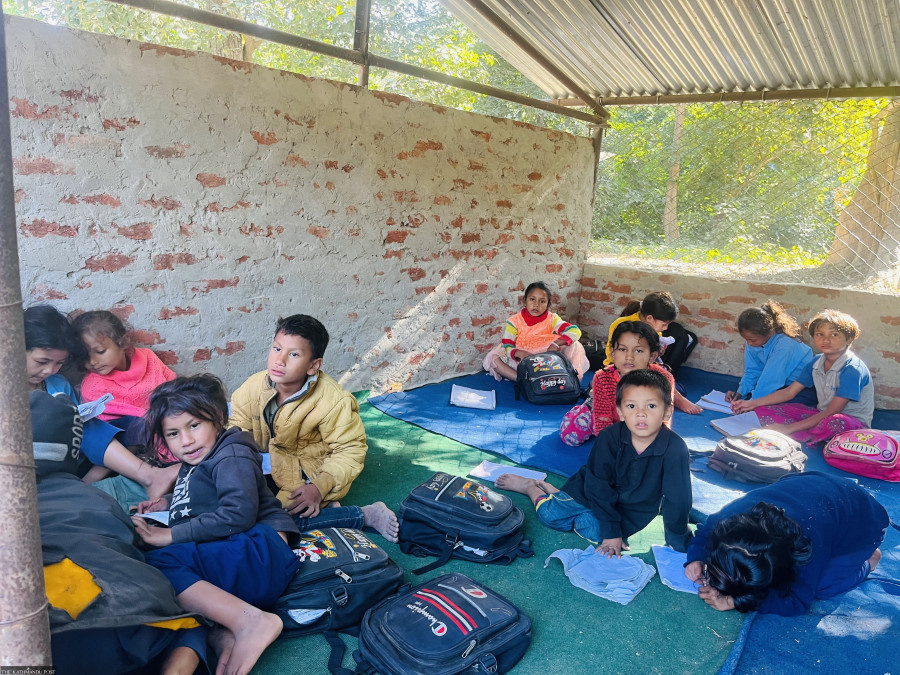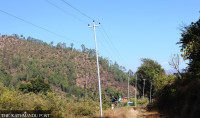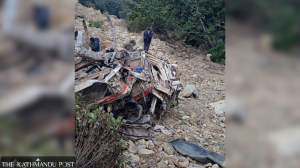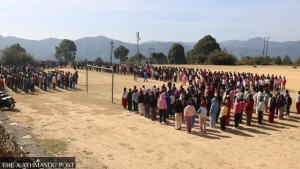Karnali Province
Surkhet children displaced by floods are dropping out of schools
In August 2014, floods hit several villages in Surkhet and displaced around 970 families. Several children living in the camp are deprived of formal education for financial difficulties.
Tripti Shahi
Babita Nepali, aged 14, has been living in a camp for flood-displaced people at Girighat of Barahatal Rural Municipality-2, Surkhet, for the past eight years. After moving to the camp, Babita joined the Rastriya Basic School in grade 5 but could not continue her studies due to financial difficulties.
“I really want to continue my studies. But my family can’t afford to buy me school supplies. I don’t even have a school uniform. So I quit school unwillingly after my guardians could not manage education expenses,” said Babita. Both of her parents are daily wage earners.
Putting aside her desire to study, Babita supports her four-member family financially with the money she earns by crushing pebbles and doing other menial jobs.
In August 2014, floods hit several villages in Surkhet and displaced around 970 families. Several children of school-going age living in the camp have been deprived of formal education due to financial difficulties.
The government covers tuition fees and provides textbooks free of cost but the cost of stationeries like copies, pencils, pens and school uniform is to be managed by the guardians.
Kamal Nepali, the son of Sunita Nepali, gave up his studies a few months ago while he was studying in grade 11. He left for India for work. “My son was compelled to leave school due to extreme financial difficulties. We have a tough time raising our four children. He wanted to continue his studies but we were compelled to send him to India for work,” said Sunita, who works in Birendranagar as a daily wage worker.
The number of children who left school is on the rise in the camp of the flood-displaced people. Poverty is taking its toll in the camp causing an alarming rate of school dropouts lately.
Buddhisara Nepali, another flood victim in the camp, said that she had been struggling to send her four children to school. According to her, two of her daughters study in grade 10 while two of her sons are now in grades 7 and 4. “We don’t have a permanent source of income so my children also miss school often. We do not get work every day. Our children do not go to school because we can’t afford to send them there,” she said.
According to Tara Pokharel, principal at Rastriya Basic School, as many as 15 children from the camp for flood-displaced people left school this year. “All of them have financial problems. The guardians have difficulties managing money for stationeries. As a result, the school dropout is quite high among the children in the flood-displaced camp,” said Pokharel.
Rastriya Basic School near the camp runs classes up to grade five. After passing out from basic school, students have to go to a secondary school in Ranighat, which takes around one hour on foot. “That is also one of the reasons why students do not attend school after grade 5,” said Pokharel. “Those who drop out help their parents take care of the household or join the informal labour market to earn money.”
In the 2014 floods, 24 people were killed while 91 others went missing. The provincial government declared them dead later. As per a report prepared by a high level committee formed by the Karnali Province government for the resettlement of the flood victims, a total of 1,045 people were displaced in the floods and landslides that year.
Many of those flood-affected families, mainly from the Dalit community and those from impoverished backgrounds, have been taking shelter in several camps at Masina, Girighat, Tikhakuna and the Women’s Training Centre in Birendranagar in the district. None of the displaced has been resettled permanently.




 18.12°C Kathmandu
18.12°C Kathmandu













